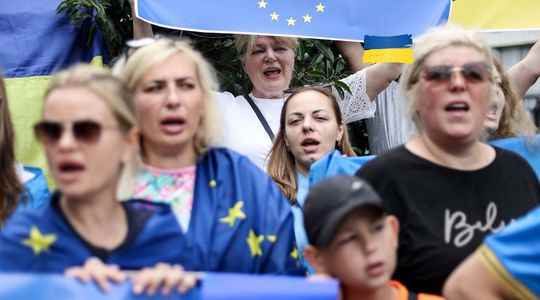The war is not going as Vladimir Putin had planned. The president of the largest country on the planet was however very close to the goal. He managed to build absolute power around him. He made the majority of Russians accept their poverty by lulling them with nationalist pride and by annihilating the most lucid. He let the oligarchs get rich by keeping them under control. It has been able to take advantage of its hydrocarbons to hold the countries of the European Union hostage. He skilfully played on the vulnerability of Westerners entangled in their contradictions, between the values they advocate and the interests they want to serve, so attached as they are to their warm lives. He still had to take a strategic step for his big project. Because Putin is not able to think of his Russia – nuclear power stretched over 11 time zones and threatened with any “encirclement” – other than as a megalomaniac empire which would exercise its domination over neighboring peoples. After having absorbed Belarus, his obsession was to reconquer this lost land of the former USSR, neighbor and cousin of holy Russia, zone of influence and buffer zone: Ukraine.
On several occasions, he tested the weakness and inertia of Americans and Europeans. In 2013, President Obama broke his own red line on the use of chemical weapons in Syria. A year later, a new test: will Westerners dare to prevent Russia from annexing Ukrainian Crimea, in defiance of international law? Will they dare to prevent Russia’s support for the separatist militias in Donbass, which figured next? Not even cap! They thought they were acquitting the dictator by giving him a bone to gnaw, then two. Putin triumphed. His plan was working wonderfully. He could calmly pursue his mad reconstitution of the Russian-Soviet empire, reinforced in his task by the successive cowardice of the West. The way was clear, everything was moving. Until the tile he hadn’t seen coming.
The tile, for Putin, is the Ukrainians
The tile is that Ukraine has become a European nation. The tile is that the Ukrainian people are no longer those of before “the greatest geopolitical catastrophe of the 20th century”, as he calls the collapse of the USSR. Alone in his bubble, the dictator has reinvented an imaginary country. Vladimir Putin romanticized it in July 2021 in a long “historical essay” where he asserts that Ukraine does not exist – forgetting in passing that Russia signed the international commitment recognizing its sovereignty and territorial integrity. In his dream, the Donbass, a region bordering Russia populated mainly by Russian speakers, was going to welcome his tanks as liberators. In his dream, the passage through kyiv would be a spring walk for his army. In his dream, Ukraine is in the Russian bosom. The reality is that she doesn’t want it. The tile, for Putin, is the Ukrainians.
Vaclav Havel had understood Ukraine’s European identity before him. In 2005, the former president of the Czech Republic described in the World the impact of the Orange revolution of winter 2004 which already, ten years before the events of Maidan, testified to the revolt of the Ukrainians against the stranglehold of Moscow: “Ukraine is a big country, and for a long time it did not seem know where to stand. It seems to indicate today that it inclines towards the Euro-Atlantic world.”
Its entry into NATO had been postponed indefinitely by the member states, for fear of offending the susceptible Putin. Ukraine had been granted an “eastern partnership”, intended for countries not intended to enter the EU – don’t offend IT, again. It is their irrepressible desire for Europe and the West that the Ukrainians are paying for with a delirious war of invasion. With their EU candidate status finally granted, they will progress towards the rule of law and a competitive economy. For the values, they are the ones who will guide us. They alone are ready to die for those of the EU, the very ones that some have the snobbery to blame more than the bloodthirsty and unequal Putin dictatorship – while enjoying, of course, the privileges of freedom of expression or of social protection. Dear Ukrainians, you are more European than us. Come quickly, you have so much to teach us.
This article is from our special issue “We Ukrainians”on newsstands August 24, in partnership with BFMTV.
